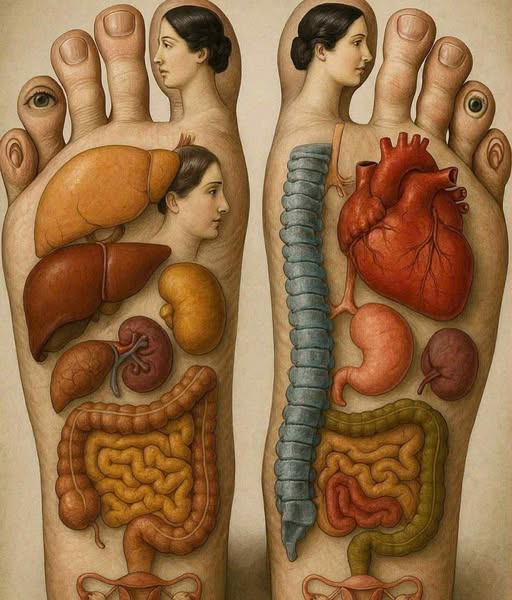If you’ve ever found yourself lying awake in bed, staring at the ceiling while your thoughts race and your toes feel like ice, you’re far from alone. Insomnia is a widespread issue, impacting millions of people across the globe. While stress, diet, and screen time are often blamed, one commonly overlooked factor might be as simple as cold feet. That’s right—your chilly toes could be sabotaging your sleep more than you realize. Both traditional medicine and modern science have long emphasized the importance of foot temperature in regulating the body’s internal systems. In fact, your feet are often called the “second heart” because of their role in promoting circulation and maintaining balance in your nervous system. When your feet are cold, it sends a signal to your brain that the environment isn’t ideal for rest, keeping your body alert rather than relaxed. Understanding this connection can open the door to natural and effective strategies for better sleep.

To grasp the link between cold feet and sleep disturbances, it’s helpful to understand thermoregulation—your body’s method of managing internal temperature. As bedtime approaches, your core temperature naturally drops, helping your brain release melatonin, the hormone responsible for sleepiness. But when your extremities, like your feet, are cold, this cooling process slows down. Instead of shifting into a restful state, your body remains on high alert. That’s why people with cold feet often struggle to fall asleep or experience frequent awakenings during the night. When your feet are warm, however, heat is more efficiently distributed throughout your body, aiding in relaxation and quicker sleep onset.
Your feet, often overlooked, play a massive role in overall health and circulation. Traditional medical practices such as Chinese Medicine and Ayurveda have long emphasized foot health, viewing the feet as vital for balancing the body’s systems. Anatomically, this makes sense—feet contain numerous blood vessels and nerve endings that support the flow of blood back to the heart. If circulation is poor, your feet get cold fast, and that cold can disturb your sleep. Prioritizing foot care at night isn’t just about comfort; it’s a biologically sound strategy to support rest and overall wellness.
So how can you tell if your sleep problems are related to cold feet? Some telltale signs include wearing socks to bed but still waking up cold, needing to tuck your feet tightly under a heavy blanket, or feeling numbness, tingling, or icy sensations in your feet before falling asleep. You might also notice that you sleep better after a warm bath or foot soak. If any of these symptoms sound familiar, it’s worth giving some extra attention to your feet in your nightly wind-down routine.
Thankfully, you don’t need to invest in expensive products to solve this issue. There are several easy and effective ways to keep your feet warm and sleep-friendly. First, try soaking your feet in warm water for about 10 minutes before bed. A temperature around 100°F (38°C) is ideal to open blood vessels and boost circulation. Add Epsom salts or a few drops of lavender essential oil to the soak for an added calming effect. Another excellent option is wearing breathable, insulating socks made from materials like merino wool or bamboo. These fabrics maintain warmth without overheating and wick away moisture, unlike synthetic materials that can trap sweat and make your feet feel even colder.
Foot massage is another powerful tool. Using warm oils such as sesame or coconut oil, gently massage your feet to increase blood flow and stimulate pressure points that promote relaxation. Focus on the heels, arches, and toes using steady but calming strokes. This technique not only warms the feet but also helps reduce anxiety and ease mental tension. Additionally, you can use a heating pad or hot water bottle at the foot of your bed. Make sure it’s wrapped in a towel to prevent burns and avoid leaving it on all night for safety reasons. For those who prefer a more active approach, gentle foot stretches like toe curls, ankle circles, or rolling your foot on a tennis ball can also do wonders. These exercises increase blood flow, release built-up tension, and support detoxification through the lymphatic system.
Foot reflexology, an ancient healing technique, suggests that specific areas on the feet correspond to organs and systems in the body. While you don’t need to follow a reflexology map perfectly, focusing on areas related to the nervous system or pineal gland—the part of your brain that regulates melatonin—can help signal the body to prepare for rest. Simply being intentional about massaging your feet can have a calming, sleep-inducing effect.
Beyond nighttime rituals, your daily habits also impact your sleep quality and foot warmth. Staying physically active promotes good circulation throughout the day. Avoid caffeine after 2 p.m., as it can interfere with sleep hormones. Instead, opt for warm herbal teas like chamomile or ginger before bed. Keep your bedroom cool—around 65°F (18°C) is ideal—but not so cold that your extremities become icy. Most importantly, develop a calming nighttime routine that includes taking care of your feet. This tells your body it’s time to relax, unwind, and prepare for deep sleep.
In a world obsessed with high-tech solutions and quick fixes, it’s easy to forget that some of the most effective remedies are also the simplest. Warming your feet before bed is a natural, low-cost way to improve sleep, support circulation, and calm your mind. Your feet are more than just the foundation of your body—they’re a powerful gateway to restorative rest. So tonight, slip on some cozy socks, treat yourself to a soothing foot soak or massage, and let sleep come naturally from the ground up.





